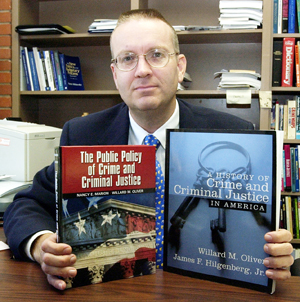CJ Prof Authors Two New Texts
 |
Willard M. Oliver
--Photo by David Gonzales
|
Willard M. Oliver, associate professor of criminal justice
at Sam Houston State University, says that criminal justice
in America has changed greatly in the last 400 years, and
international terrorism will have a major effect on our lives
in the foreseeable future.
Oliver is the author of two new primary criminal justice textbooks--"A
History of Crime and Criminal Justice in America" and
"The Public Policy of Crime and Criminal Justice in America."
Oliver's "History..." provides an overview of the
origin and development of the American criminal justice system
from the arrival of the first settlers during the Colonial
period into the 21st century.
"I am surprised at how much criminal justice has developed
and changed over our history," said Oliver. "We
often think of America as being somewhat punitive, especially
in regard to many states retaining and using the death penalty.
"But if you look at our history, we have become far less
punitive and more rehabilitative across time."
Oliver's history is co-authored with James F. Hilgenberg Jr.,
a former chair and now professor emeritus of history at Glenville
State College in West Virginia.
Each chapter begins with an overview of the political, economic,
social, and cultural forces that shaped society within each
time period. Following the overview, the history of ordinary
crime, as well as extraordinary high profile criminal acts,
is examined.
The text then uses this discussion of historical context and
crime as a foundation to describe and analyze the development
and impact of police, law, courts, corrections, and juvenile
justice during the various eras of American history.
Oliver said that the public policy textbook, co-authored with
Nancy E. Marion, is "the first full-fledged textbook
on the public policy of crime and criminal justice and is
meant as an introductory textbook to both undergraduate and
graduate students."
The book concludes with a focus on the criminal justice system,
including police, courts, corrections and juvenile justice.
It uses a real-world example, the 1994 Crime Bill, to convey
how the public policy process directly impacts the criminal
justice system.
"The 1994 Crime Bill was the most comprehensive federal
criminal justice policy legislation to date and has had a
significant impact upon the criminal justice system, and especially
in the area of policing." said Oliver.
"While the debate still reigns over whether or not it
actually contributed to the reduction in crime since its passage,
it did promote the concepts of community policing across a
broader swath of American communities."
Currently, he said, the issue of Homeland Security is the
public policy related to criminal justice that is starting
to have an impact and "may very well be the overarching
policy for police over the next decade."
Looking at criminal justice from a historical perspective
can help ordinary citizens as well as students understand
how our global society and international terrorism are likely
to affect our foreseeable future, Oliver said.
"I think that by understanding our history, we can better
understand what America has always stood for, a country of
freedom and democracy that we are willing to fight and die
for," said Oliver.
"Whether it is the soldiers overseas or the cop on the
beat, we strive to retain these freedoms for all Americans.
Understanding the public policy process helps us to understand
how we go about working to ensure these freedoms, while facing
the daunting task of managing an open society, fighting a
global war on terrorism, and adjusting to a world without
walls."
Oliver has been working on both textbooks since moving to
Sam Houston State from Radford University in Virginia in the
summer of 2003.
He said he is indebted to the College of Criminal Justice
and SHSU "for giving me the opportunity and resources
to be able to write two major textbooks simultaneously."
—END—
SHSU Media Contact: Frank
Krystyniak
Sept. 8, 2005
Please send comments, corrections, news tips to Today@Sam.edu.
|


